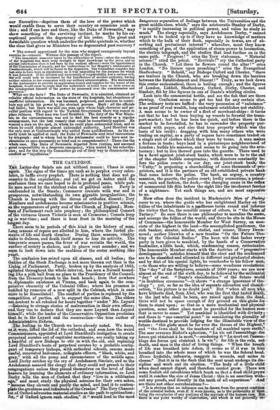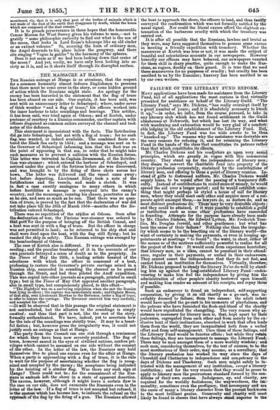THE CAULDRON.
Tax Latter-day Saints are not without reason : Chaos is come again. The signs of the times are such as to perplex every ealcu- later, to baffie every prophet. There is nothing that does not go counter to the expectation; andyet we get on batter amid , the confusion than we once hoped to do in profound peace, while pub- lie men moved by the strictest rules of political- order. Party is confounded in the Senate; Commerce coexists with war and is prosperous, notwithstanding its own, gigantic irregularities; the Church is heaving with the throes of orthodox dissent; Tory Members and archdeacons become missionaries in Positive science, as the regenerators of piety and of the Church 14 Pigland ; Mem- beri of Parliament rush into prophesy ; the philosophical Consert of the virtuous Queen Victoria is seen at Cremorne ; Consols keep on in war-time ; and there is hoar, frost in the morning of the lunged day.
There seem to be periods of this kind in the history of man. .
LOng, seasons of repose are allotted to him, where, the turbid, ele- ments of life and death 'slumber. During these seasons, viality winks to dulness, and death itself seems to leee its activity. The temperate season passes, the fever of war revisits the world, the surface of society is shaken, and in places rent asunder; and we seem to look down into the cauldron of the crater seething like yeast. The confusion has seized upon all classes, and all bodies; the Galileo of the Stock Exchange is not more thrown put than is the Liebig of Parliament. Party, broken up by the analysis of 1852, agitated throughout the whole interval, has seen a Russell bound, ing, like a pith ball from no plape to the Presidency of the Council; from the Treasury-bench to the back bench; from that, nowhere to ,diplomatic existence at Vienna, and back agein to the com- parative obscurity of the Colonial Office; where his presence is net4fled by rumours of a new split in the Cabinet., which is once mere to be Russellated! The conflict of partiesis replaced by the cempet1tion of parties, all to support the same idea. The elders are content to sit rebuked for hours together "ender " Mr. Layard -7-listening to strange stories of malversation in their own offices; and they rise to declare that they are more Layard than Layarcl himself; while the leader of the Conservative Opposition proclaims that he is the Layard and the resurrection—the true author of A4ministrative Reform. 1-The boiling in the Church we have already noted. We have, sex .were, lifted-the lid of thecathedral, and seen_ ow the weird Commiesioners, appointed at Lord Blandford'a instigation to create perpetual curates out of capitular mortmains, are really taking up eller:Ain' of new Bishops to stir in with the old, and replacing Lord Blandford's hosts of perpetual curates by a probable contin- gent of temporary bishops, with cathedral schools, canons made useful, renovated bedesmen, collegiate officers, "black, white, and grey," with all the pomp and circumstance of the middle ages. Lord Derby catches up the cry of Archdeacon Sinclair, and as the Archdeacon assured the clergy that they could not preach to their congregations unless they placed themselves on the level of their hearers by learning the elements of ordinary information, so .Lord Derby tells the men of Oxford that they live in a Utilitarian age," and must study the physical sciences for their own sakes, " because they elevate and purify the mind, and lead it to contem- plate the greatness and infinitude_ of the Creator." The Tory Chancel- lor of Oxford advocates material studies as the path to spiritualism ; for, " if Oxford ignore such studies," it " would lead to the most dangerous separation of feelings between the Universities and the great middle class, which," says the aristocratic Stanley of Derby, " is rapidly increasing in political power, and value no study so much." The clergy especially, says Archdeacon Derby, " cannot expect to be looked up to if they have no knowledge of matters which to the bulk of their flock, especially in towns, are of ab- sorbing and preeminent interest" : wherefore, must they know something of gas, of the application of steam-power to locomotion, the electric telegraph, and the studies that lead further on in the same path. "Progress ! " cries the Tory statesman. " Material science!" cried the priest. " Revivals!" cry the Cathedral party in the Church. " Let there be flowers round the altar !" cries London. "No licence upon preaching!" cries the Evangelical Shaftesbury. " Behold," say Bishops Oxford and Chester, "there are traitors in the Church, who are breaking down the barriers between the Establishment and Dissent I " Truly, as we look down this crater ecclesiastical, there is boiling enough ; and the figures of London, Liddell, Shaftesbury, Oxford, Derby, Chester, and Sinclair, flit by like figures in one of Dante's whirling circles.
Look into the commercial kettle, and see the fish that are there stewing.. Confusion seems to get too bad for any certain clue. The ordinary tests are baffled : the very possession of " substance" is no proof of real wealth, long endurance establishes not stability.
A Mall seems to be owner of a fleet of merchant-ships : it turns on a e as u n ying up vessels to forestal the trans- port-market; but he has been too quick, and before there is the market to be forestalled, he has to surrender the property pur- chased with paper, and also that true property which was the basis of his credit; dragging with him many others who were trading on capital, as a party of rogues have sometimes traded on a single suit of clothes which they wore by turns. A man makes a fortune in trade; buys land in a picturesque neighbourhood of London ; builds his mansion, and seems to be going into the ans. toeraey ; but in lieu thereof goes into the gazette. There used to be a howl against joint-stock banks, which were to be to the end of the chapter bubble conspiracies; with directors constantly be- fore the police courts : in our day, one joint-stock bank, the "Unity," is projecting a shareholding of some thoimands of pro- prietors, and it is the partners of an old-established privatkbank that come before the police. The bank, an argosy, a country- mansion, the gazette, the police court; lordly oonnexions, a prison- van, rank and fashion, the dock,—the changing scene in the reflex of commercial life flits before the sight like the incoherent fancies of a nightmare. Yet such things are, and are most expend.* to us.
How often does the incident in bfackenzie's Man of libelfsg recur to us, where the guide who has enlightened Harleyon 'the follies of the inhabitants in am i
adhouse turns round and nforms the visitor that he, the sensibk censor of others, is " the, Chaim of Tartary." Be sure there is one philosopher to moralize the seene# and scourge the follies of the world; and there he sits in the House of Commons—the honourable Member for West Surrey, an asso- ciate of the highest in the land—the accomplished gentleman, the rich banker, senator, scholar, statist, and censor, Henry Drum- mond; author likewise of a new treatise " On the Future Des- tiny of the Celestial Bodies." The keen wit that lashes every party in turn gives to mankind, by, the hands of a Conservative bookseller, a little book, which, condemning reason, ratiocinates. The honourable Member starts with the doctrine of " progressive' development "; satisfies himself that the elect and the condemned are to be classified and allocated in different and graduated abodes; and by dint of his special lights, he vouchsafes to his fellow men, —to those who are willing to believe—some wondrous revelations. The " day" of the Scriptures, consists of 2000 years; we are now almost at the end of the sixth day, to be followed by the millennial " day " of rest. " Dante's classification" of the future world : "is doubtless erroneous "—it shows "a strange ignorance of the-: ology "; 3,et, so far as the idea of separate allocation and claseili- 4 cation, "his picture is no doubt just." But "when all men o, have hitherto died, fromAbel, who was the first that tasted deit to the last who shall be born, are raised again from the there will not be space enough of dry ground on this globe for them to stand upon ; so that as a mere mechanical and physical question, some other place must be provided for the human race that is never to cease." Yet mankind is identified with divinity ; and there is "one essential point" in considering the plurality of °i worlds destined to provide lodging for the illimitable view of the 1 future: "this globe must be for ever the throne of the Highest," and "the Jews shall be the teachers of all mankind upon earth.", , The seer reverses Biohat's aphorism, " La vie est Passemblage des forces qni resistent a in mort,"—rendering it " La mort est l'assem. 1 blage des forces qui resistent a la vie "; for life is the rule, mt.: death, and man is the chief of living things. " When the breath of life was breathed into Adam, it seems as if it was in hid; breathed into the whole mass of which he was the federal head. '- Hence hydatids, infusoria, maggots in wounds, and mites in cheese." But it is in the flesh that the soul must undergo its dis- cipline and work out its election. "The body of a little child '- when dead cannot digest, and therefore cannot grow. There are{ some foolish old catechisms which teach us that a dead child grows until it reaches the size of Jesus Christ : this is an assertion with...4 out any proofs, and directly in the teeth of all experience." An4
are there not other corroborations ?— -
"It is obvious that no inference can be drawn from the present condition of the celestial bodies, even if it were known, as to the probability orthirei being the receptacles of any portions of the myriads of the human race. But there is one point worthy of observation, and which is not generally re- membered, viz. that it is only that part of the bodies of animals which is not made of the dust of the earth that disappears by death, whilst the bones which are composed of the dust remain."
It is to preach perseverance in these hopes that the honourable Censor Morum for West Surrey gives his volume to man —not to gratify " some philosophic curiosity to find out what is the use of the moon, that looks in Lord Rosse's telescope like an old cinder or an extinct volcano." So, scorning the hum of ordinary men, the Angel descends to his place below the gangway, and there sits singing " Vogue la galere" to the harmony of the spheres. Does it not seem as if we had been looking down that crater of the moon P And yet, verily, we have only been looking into so- ciety as it is, and as it shows itself through its disrupted surface.



































 Previous page
Previous page